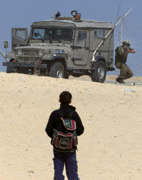| |
 |
|






|
We hope that
you'll feel our website is worthy enough to contribute a few pounds to
the bandwidth bills.
|




|
|
 |

Teaching Peace
|
| Last
uploaded : Thursday 3rd Jan 2002 at 19:32 |
| Contributed
by : Debra deLee |
|
 Teaching Peace Teaching Peace
By Debra DeLee
The publication of a report on Palestinian textbooks from the Center for Monitoring the Impact of Peace (CMIP) has triggered another round of stories that accept accusations from the group at face value without bothering to check the reliability of its work. However, two Jewish academics (one American, one Israeli) recently completed studies that call into question the conclusions and value of CMIP?s efforts.
Professor Nathan Brown of George Washington University issued a report in which he found, ?the Palestinian curriculum is not a war curriculum; while highly nationalistic, it does not incite hatred, violence, and anti-Semitism. It cannot be described as a ?peace curriculum? either, but the charges against it are often wildly exaggerated or inaccurate.?
?Where do persistent reports of incitement in Palestinian textbooks come from?,? he asked. ?Virtually all can be traced back to the work of a single organization, the ?Center for Monitoring the Impact of Peace.??Critics charge that the Center?s real purpose is to launch attacks on the Palestinian National Authority, and it would be difficult to contest such a conclusion?The Center?s own reports suggest such suspicions are well-founded?While often highly misleading and always unreliable, most of the contents of the Center?s reports are not fabricated. Clearly false statements are rare, though when they do occur they are far from minor?
?But the real problems with the Center?s reports lie elsewhere?First, the Center generally ignores any historical context in a way that renders some of its claims sharply misleading?The second problem with the Center?s work is its prosecutorial style. Its reports offer little more than brief themes and then list statement after statement to prove the point. Any evidence that contradicts the Center?s harsh message is ignored, obscured, or dismissed, such as maps that clearly draw Palestinian governorates as covering only the West Bank and Gaza, an extended and laudatory treatment of Gandhi?s nonviolence, or a tour of Palestinian cities that includes only those under [Palestinian National Authority] rule. Other evidence is interpreted inaccurately. For instance, a topographical map of Palestine (inserted most likely to avoid drawing any sensitive political issues regarding borders) is presented as a denial of Israel?s existence??
He noted that, ?The final and perhaps the largest problem with the Center?s work lies not simply with the reports themselves but in how they have been read. The Center?s conclusions may be unsupported by the evidence it presents and undermined by the evidence it overlooks. But it does include some qualifications and elliptical wording that usually prevent its reports from outright falsehood. When its reports gain wider circulation, however, the buried qualifications get lost.?
At the same time, people concerned about CMIP?s findings often fail to ask about the treatment of Arabs and Palestinians in Israeli textbooks.
Dr. Ruth Firer, an Israeli expert on peace education at Hebrew University, recently completed a project on the narrative of the Israeli-Palestinian conflict as found in the textbooks of both sides. According to her findings, 60% of Israeli textbooks are aimed at regular/secular schools, 18% are geared towards religious-Zionist schools, and the rest are for ultra-Orthodox schools. She found the textbooks in regular schools (in general and beginning only recently) do give Palestinian national identity a place within the story of heroic Zionism in Israel. However, she added, many aspects of the Palestinian narrative remain almost entirely absent in these texts, such as the issue of the creation of refugees in 1948 and 1967. Meanwhile, in the religious-Zionist schools, the textbooks focus on national education, with few references to ?Palestinians? and negative references to generic ?Arabs.? Finally, the textbooks in ultra-Orthodox schools include no concentration on Israeli national identity or history and no focus on the Holocaust. This set of books, she found, promotes a xenophobic attitude in general, including very negative portrayals of all non-Jews, including Arabs.
In the end, she suggested, people who want to teach reconciliation need to get to the root problem with textbooks by addressing the ?national textbook,? i.e., the reality within which people live. After all, she said, you can?t teach people who are starving that they have food.
No one is questioning the need to address legitimate cases of incitement to violence and anti-Semitism when they occur. There definitely have been instances of ugly incitement directed against Israel and Jews that have appeared in the Arab media and elsewhere that deserve strong condemnation. But the serious need to address such cases is only undermined by misrepresentation of the facts. People should think about the motivations and accuracy of those who try to use this issue as a bludgeon against the peace process.
______________________________
Debra DeLee is President and CEO of Americans for Peace Now.
|
|
|
 |
|

